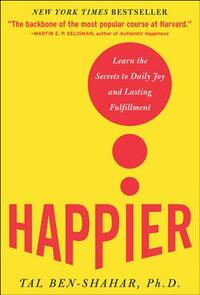Take a photo of a barcode or cover
hopeful
informative
inspiring
reflective
medium-paced
reflective
slow-paced
This was a pretty useful self-help book. It doesn't pretend there's an easy path, but promises a fulfilling journey. It also doesn't suggest that "Happy" is a place you reach, but instead, a practice. It's got a lot of breaks with situations to consider and how they'd apply to your life. I think I learned some things, and I think I'll revisit the book now and again.
Audiobook
I can see this being a book I revisit regularly. It is very simple yet very dense. So good.
I can see this being a book I revisit regularly. It is very simple yet very dense. So good.
I got this as an Advance Reader Copy quite some time ago and never got around to reading it. I just found it in my basement and decided to give it a shot. I found it to be a surprisingly well-written and cogent treatise on the topic of happiness. I am not fond of self-help books as a general category, but this one does offer a fairly coherent philosophy of happiness.
Some great advice and practices on living better. A good compliment to a life with spiritual practices - totally Jewish compatible!
I guess I shouldn't expect too much from a self-help book--even if it is written by a college professor. I think the book is designed to help Harvard students who still feel malaise even though they have "accomplished" a lot. The basic premise is to redefine what happiness is and then do things (set goals) so that you become happier. It boils down to keeping busy so you don't notice you're unhappy--as far as I can tell. The book is superficial: it can't help people whose life circumstances disempower them--such as those experiencing extreme poverty or racism. So already it can't help something like half the world--or more--be happier. In fact he never addresses the problem that wanting to be happier is pretty much a first world, middle to upper-middle class phenomenon. The book is also filled with cliches, like "all the gold in Fort Knox." The author is too lazy to find precise language to express the complexity of the happiness phenomenon. It's contradictory, too. All the while the author tells the reader to set goals to become happier, he cites studies that say that we have a happiness set point that eventually returns after big events like winning the lottery or becoming paralyzed. Towards the end of the book he tries to address this contraction, but I see little evidence for his claim or resolution to this conundrum.
In my experience, it's much more helpful to recognize that happiness ebbs and flows, and that there are different kinds of happiness. As we learn to live with the ups and downs of life, we both accept the circumstances of our lives and develop the clarity to see where we can change. That is a harder and more nebulous task that setting goals--but ultimately more fruitful.
In my experience, it's much more helpful to recognize that happiness ebbs and flows, and that there are different kinds of happiness. As we learn to live with the ups and downs of life, we both accept the circumstances of our lives and develop the clarity to see where we can change. That is a harder and more nebulous task that setting goals--but ultimately more fruitful.
Nothing mindblowing, but ties a few things together neatly. Pretty good, all considered.
No wonder the authors class in happiness is the most popular one at Harvard! I thought this would just be another fluffy book but unlike other books around happiness this one triggered realizations, made me reflect and apply what I had learned immediately. I also felt compelled to share the main points with online communities I lead because I feel like we can all benefit from it. Highly recommend reading this. Take it a chapter at a time. Pause. Reflect and learn how to be happier



